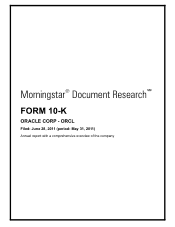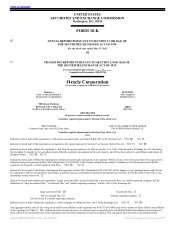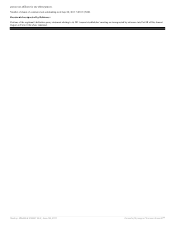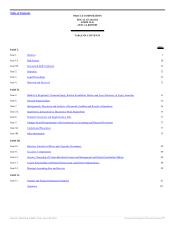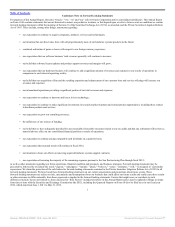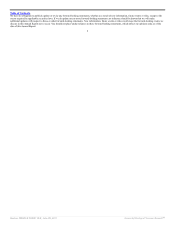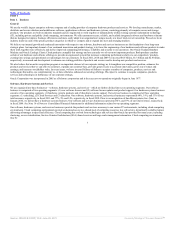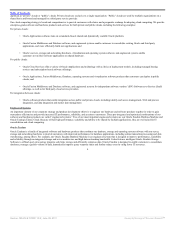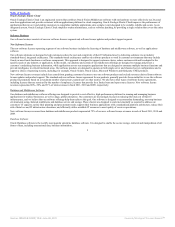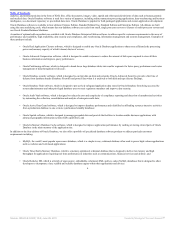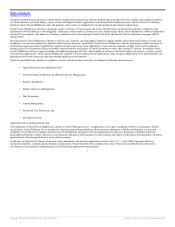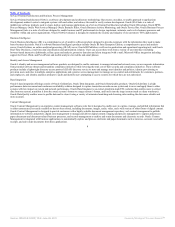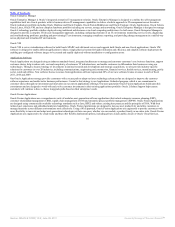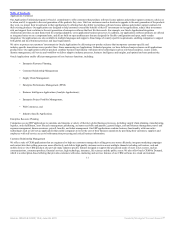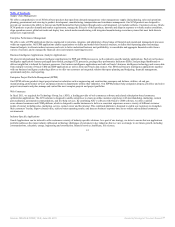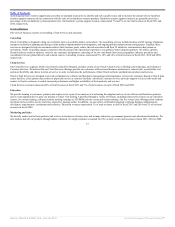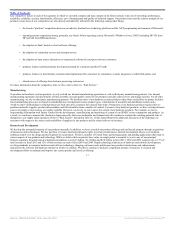Oracle 2010 Annual Report Download - page 11
Download and view the complete annual report
Please find page 11 of the 2010 Oracle annual report below. You can navigate through the pages in the report by either clicking on the pages listed below, or by using the keyword search tool below to find specific information within the annual report.
Table of Contents
Middleware Software
Oracle Fusion Middleware software is a broad family of application infrastructure software products that is designed to form a reliable and scalable foundation
on which customers can build, deploy, secure, access and integrate business applications and automate their business processes. Built on the Java technology
platform, Oracle Fusion Middleware suites and products can be used as a foundation for custom, packaged and composite applications.
Oracle Fusion Middleware software is designed to protect customers’ IT investments and work with both Oracle and non-Oracle database, middleware and
applications software through its “hot-pluggable” architecture (which enables customers to easily install and use Oracle Fusion Middleware software within their
existing IT environments) and adherence to industry standards such as Java Enterprise Edition (Java EE) and Business Process Execution Language (BPEL),
among others.
By using Oracle Fusion Middleware software, we believe our customers can better adapt to business changes rapidly, reduce their risks related to security and
compliance, increase user productivity and drive better business decisions. Specifically, Oracle Fusion Middleware software is designed to enable customers to
integrate heterogeneous business applications, automate business processes, scale applications to meet customer demand, simplify security and compliance,
manage lifecycles of documents and get actionable, targeted business intelligence; all while continuing to utilize their existing IT systems. In addition, Oracle
Fusion Middleware software supports multiple development languages and tools, which enables developers to build and deploy web services, websites, portals
and web-based applications. Oracle Fusion Middleware software is used to support Oracle Applications, other enterprise applications, ISVs that build their own
applications and business processes that span multiple application environments.
Oracle Fusion Middleware software is available in various software products and suites, including the following functional areas:
• Application Server and Application Grid;
• Service-Oriented Architecture and Business Process Management;
• Business Intelligence;
• Identity and Access Management;
• Data Integration;
• Content Management;
• Portals and User Interaction; and
• Development Tools.
Application Server and Application Grid
The foundation of Oracle Fusion Middleware software is Oracle WebLogic Server—an application server that is compliant with the Java Enterprise Edition
specification. Oracle WebLogic Server incorporates clustering and caching technology, which increases application reliability, performance, security and
scalability. Oracle JRockit is a high performance Java Virtual Machine designed to run Java applications on multi-core processors with higher and more
predictable performance. Oracle Coherence is an in-memory data grid solution designed to reduce latency and improve performance and scalability of business
applications by allowing applications to access data in-memory.
In addition, we offer Oracle Tuxedo, which runs legacy, mainframe, and non-Java applications written in the C, C++, and COBOL languages that have
transaction reliability, scalability and performance requirements. Oracle GlassFish Server enhances the value of Oracle Fusion Middleware software for
developers by accelerating development practices and decreasing application time-to-market.
7
Source: ORACLE CORP, 10-K, June 28, 2011 Powered by Morningstar® Document Research℠

